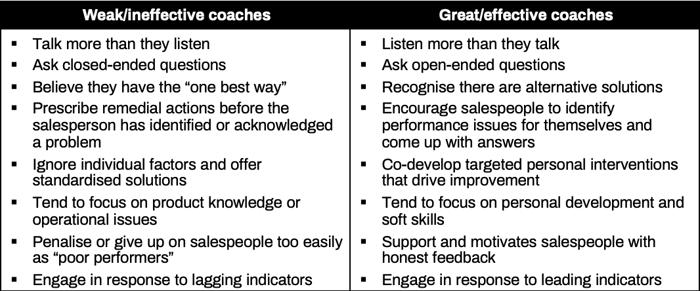Establishing the foundations of a coaching culture
July 26, 2021

This article was first published in issue 7.3 of the International Journal of Sales Transformation, and I'm very pleased to be able to share it here...
 What’s the one thing that separates truly effective first level B2B sales managers from the rest? You can make a case for their ability to motivate, or to create an environment of responsibility and accountability, but there’s good reason to believe that their ability to coach, develop and get the best out of their people is their single most important asset.
What’s the one thing that separates truly effective first level B2B sales managers from the rest? You can make a case for their ability to motivate, or to create an environment of responsibility and accountability, but there’s good reason to believe that their ability to coach, develop and get the best out of their people is their single most important asset.
But there’s a problem: although coaching is a trainable skill, few first level sales managers have been formally trained in it. Even sales organisation that invest significantly in training their salespeople frequently fail to invest appropriately in developing the skills of their managers - despite the obvious impact that these sorts of investments could have on their long-term success.
Compounding the problem, few first level sales managers spend anything like enough time on coaching or establish a regular cadence for it. Although studies from Objective Management Group and others suggest that front line sales managers need to invest anything from a quarter to a third of their time on coaching, many spend less than 10% of their time on it, and often don’t do even that particularly well.
It doesn’t help that many sales managers are appointed to their first sales management role primarily because of the results they achieved as salespeople. But the correlation between being a great salesperson and a good sales manager is questionable - particularly if the salesperson’s results were achieved because of a lucky territory assignment or (worse) a single-minded lone wolf style determination to succeed at all costs regardless of the consequences...
Ineffective vs Effective Sales Coaches
The differences between weak sales coaches and great sales coaches are stark:

The Successful Sales Coaches’ Mindset
If you’re to establish the foundations of an effective sales coaching culture, I suggest that you start by emphasising the appropriate behaviours and mindsets. The most successful sales coaches:
- Recognise that being respected by their salespeople is far more important than being liked. A newly promoted sales manager’s attempts to behave as if they are still “one of the gang” almost always misfire
- Communicate what their salespeople need to hear, not what they want to hear - if something needs saying, the manager needs to say it, and not hold back. In this respect, great sales coaches need to behave like a personal trainer, not a bartender
- Believe that their salespeople are far more likely to learn and improve if they are encouraged and helped to work out answers for themselves, rather than being told what to do. They see their role as a guide, rather than an instructor
- Cultivate and expect an environment of self-awareness and self-honesty, as well as honesty towards others. If salespeople persist in fooling themselves, they will inevitably mislead others. Managers must make it clear that they will not tolerate intentional dishonesty towards others
- Challenge their salespeople to recognise and address any comfortable untested assumptions they may have made about the current state of any of their opportunities, and require them to justify the assessments they have made
- Establish a regular cadence for coaching - blocking time out in advance and establishing a schedule as well as responding to ad-hoc requests and opportunities and investing an adequate amount of time in the process.
Moving the Middle
Like most development activities, the greatest benefits of coaching are typically seen in helping the middle of the sales organisation to adopt the behaviours observed amongst top performers, but coaching is also relevant to both the best and worst performers.
When it comes to top performers, coaching conversations can help managers uncover what has made these salespeople successful, in order that the learning can be shared with the rest of the organisation - as well as helping the top-performer to fine-tune their activities.
When it comes to poor performers, coaching conversations can help to establish whether the salesperson has the potential to improve - this is often as much to do with their mindset as their competencies. If it becomes apparent that the individual is unwilling or unable to change, the manager needs to determine whether they have a future in their current role.
And when it comes to moving the middle, coaching conversations can help to reinforce the benefits of change to the individual, and to establish agreed action plans that focus on a handful of the most promising areas for improvement.
The Focus of Coaching
Coaching can have many different objectives, and it’s helpful to avoid mixing the focuses up in a single coaching conversation - or at least to compartmentalise the conversation into different focus areas. Here are five of the most common focuses:
- Mindset coaching equips and encourages salespeople to develop positive attitudes, behaviours, and habits
- Skillset coaching equips and encourages salespeople to develop and apply specific sales skills
- Strategy coaching equips and encourages salespeople to think through, develop and implement appropriate strategies to maximise their performance
- Opportunity coaching equips and encourages salespeople to improve their qualification and management of specific opportunities
- Activity coaching equips and encourages salespeople to prepare, execute and analyse the outcomes of key activities
Each coaching intervention should result in some sort of simple agreed plan that is owned by the salesperson and subsequently reviewed with the manager.
What Motivates your Salespeople?
A surprising number of sales managers report that they don’t believe they need to know what motivates their people, but if they are to stimulate the desired change in behaviour in the most effective way, it’s surely vital to understand whether each individual is intrinsically, extrinsically, or altruistically motivated.
Knowing whether they are driven by job satisfaction, money or the desire to help others is key to helping the salesperson to visualise the rewards of self-development. And it’s just as important to identify and constructively confront any self-limiting beliefs that that may be holding them back.
Measuring the Effectiveness of Coaching
Finally, here are a few of the most obvious ways of assessing whether coaching interventions are working:
- Are you seeing the desired changes in attitude, behaviour, and activity?
- Are you seeing the desired changes in their performance as salespeople - for example, the number and value of newly identified qualified opportunities, time in stage and average sales cycle length, quality of qualification and forecast accuracy and improvements in win rate, deal value and performance against quota?
Of course, this requires that you and your salesperson agree on what changes are expected, how they will be accomplished and how progress will be measured. But if you don’t know or haven’t agreed what outcomes you jointly want to achieve, real improvement is inevitably that much less likely.
By the way, you can subscribe to the always-excellent International Journal of Sales Transformation here.
About the Author
 Bob Apollo is a Fellow of the Association of Professional Sales, a founding contributor to the International Journal of Sales Transformation, a recognised Sales Futurist, an active member of the Sales Experts Channel, and the driving force behind Inflexion-Point Strategy Partners, the leading proponents of outcome-centric selling.
Bob Apollo is a Fellow of the Association of Professional Sales, a founding contributor to the International Journal of Sales Transformation, a recognised Sales Futurist, an active member of the Sales Experts Channel, and the driving force behind Inflexion-Point Strategy Partners, the leading proponents of outcome-centric selling.
Following a successful corporate career spanning start-ups, scale-ups and market leaders, Bob now works as a strategic advisor, mentor, trainer and coach to ambitious B2B sales organisations - teaching them how to differentiate themselves through their provably superior approach to achieving their customer's desired outcomes.


Comments